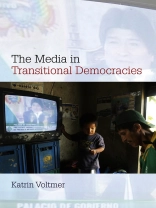The last quarter of a century has seen an unprecedented wave of democratization around the globe. In these transitions from authoritarian rule to a more democratic order, the media have played a key role both by facilitating, but frequently also inhibiting, democratic practices to take root. This book provides an accessible and systematic introduction to the media in transitional democracies. It analyses the problems that occur when transforming the media into independent institutions that are able to inform citizens and hold governments to account. The book covers the following topics:
- normative conceptions of media and democracy;
- the role of the past in the transition process;
- the internet as a new space for democratic change;
- the persistence of political interference in emerging democracies;
- the interlocking power of media markets and political ownership;
- the challenges to journalistic professionalism in post-authoritarian contexts;
- the role of the media in divided societies;
İçerik tablosu
Contents
Detailed table of contents
Introduction
PART I:WHAT DEMOCRACY – WHAT MEDIA?
1 Democracy and democratisation: one idea, many roads
2 Democratic media: a question of means and ends
PART II:THE MEDIA AND POLITICAL CHANGE ACROSS TIME AND SPACE
3 Mass media and political change: technological structure and journalistic agency
4 Complex transitions and uncertain outcomes: the media and democratisation over time
5 Emerging media systems and the legacies of the past
PART III:TRANSFORMING THE MEDIA
6 Media and the state
7 Media markets
8 Political parallelism
9 Journalistic professionalism
Conclusion
Endnotes
Bibliography
Index
Yazar hakkında
Katrin Voltmer is senior lecturer in the Institute of Communication Studies at the University of Leeds.












